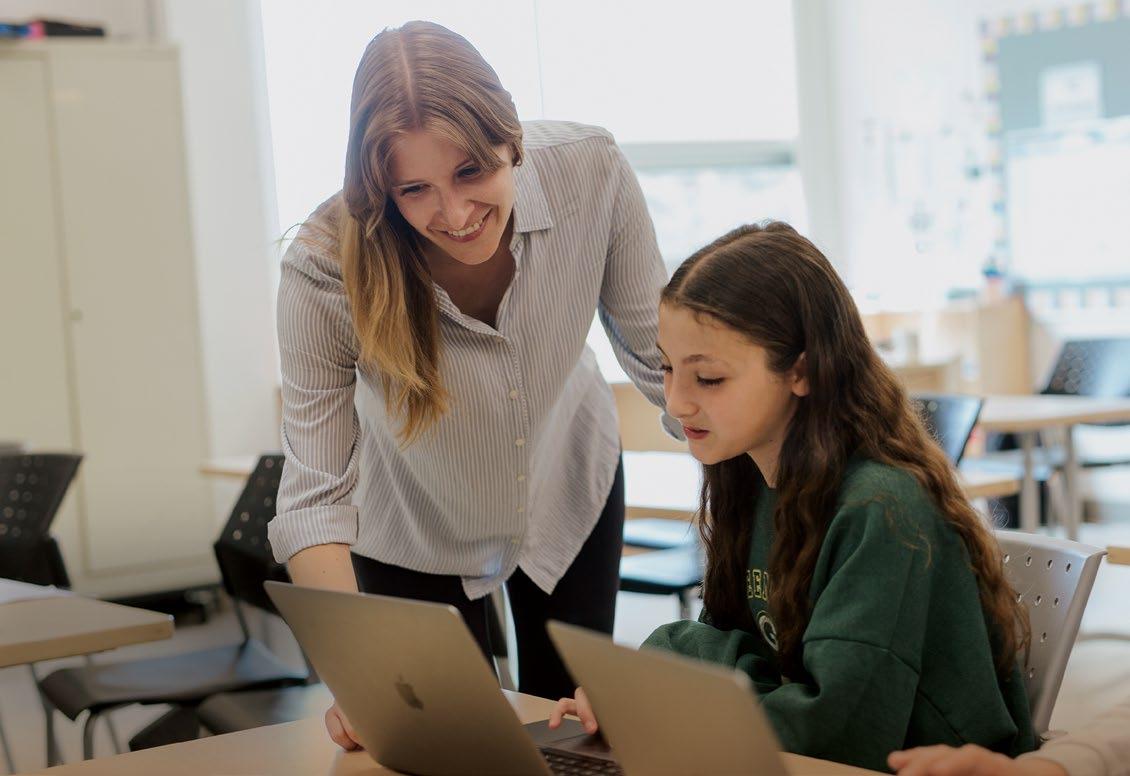
2 minute read
Exploring how powerful literary experiences shape our way of thinking
My story at Leo Baeck began as a student in Mr. Bender’s Grade 8 Language Arts class. I was handed a copy of Lord of the Flies, the gruesome pig’s head staring up at me from the cover of the book – I didn’t think I’d enjoy this one.
As we read through the first chapter, something life-altering happened. Mr. Bender told us to pick up our pencils, pens and highlighters and mark up the book. Mark up the book? He told us to underline phrases that spoke to us, circle words that caught our attention and write our reactions in the margins. I was in shock. This was sacrilegious – I didn’t think you could write in a book. We looked at each other with wide eyes and disbelieving smiles. We were defacing a book – at school!
Advertisement
Over the course of the school year, we studied numerous texts and with each of them, we picked up our pencils, pens and highlighters and marked them up. This simple act – at first seemingly rebellious – was actually a practice of analysis, and led me to my love of literature. Fast forward 16 years, and I am now a Middle School teacher working to foster the same passion in my students.
Books, stories shared and journeys explored have the power to impact the way we understand ourselves and others. Each page offers lessons – the development of our capacity to empathize and deeply understand the perspectives of others.
We Remember is an interdisciplinary Holocaust unit that students explore through both their Language & Literature and Individuals & Societies classes. The course of learning explores the events of the Holocaust as a way of understanding our history and identity as Jews. Ultimately, it helps generate a global understanding of genocide, encouraging students to explore ways of memorializing and protecting individuals and their stories. The statement of inquiry that guides our learning is, “Understanding the past can shape identity, safeguard memory and foster empathy.”
In our Language & Literature class, our focus was on the personal and emotional experience of the Holocaust. As hearing directly from survivors is more challenging today, we leaned on a variety of books to engage with these painful and heroic stories.
No longer in the presence of a survivor, one might wonder if the stories students read will impact them in the same way. I can attest, though, that through this experience something special happens when you provide students with exceptional book choices. They each selected a biography or autobiography that piqued their interest and I witnessed how the power
Differentiated Learning
Jewish Identity

Social-Emotional
Wellbeing
Teacher Development of their choices paved the way for them to have a deep connection with the learning material. We fostered stronger connections to their Jewish identities and they felt proud of their Jewish heritage.


The students’ summative assessment integrated their historical knowledge from Individuals & Societies, where students chose a creative medium to memorialize the legacy of the Holocaust. Through drawings, paintings, collages, mosaics, sculptures, short stories and photo journals, students contextualized challenging themes such as survival, courage, liberation, resilience, power and hope. These beautiful memorials express the depth of understanding and the emotional connection these students were able to make.
This is my first year as a Middle School teacher and my first time tackling this difficult subject area with students. I drew courage and inspiration from my own experiences and from Mr. Bender’s deliberate teaching about connecting with the books we read. The pages of a book offer a safe space to react, confront and sit with a story’s message. Throughout the unit, the ties between us were strengthened as students and teachers, responsible global citizens and faithful Jewish people.
“The book I chose for my project was Anne Frank Remembered by Miep Gies and Alison Leslie Gold. Miep Gies put her life at risk to help Jews and even though she had to constantly live in fear of being caught, she still helped them. Safeguarding Miep’s story is important because people should get to know how courageous she was.”






